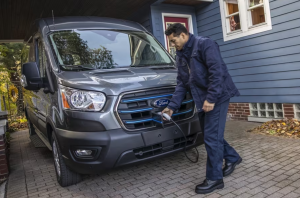
Local Partnerships Propel Expansion of Electric Vehicle Infrastructure Across Oregon
As the EV market continues its impressive trajectory in Oregon, local businesses and government bodies are intensifying to expand the state’s infrastructure.
Oregon is a leader in the EV revolution, ranking fourth in the United States for plug-in vehicle ownership per capita. As of November 2023, the state boasts 83,047 registered EVs and 2,960 public chargers strategically placed across 1,182 locations. This surge in EV ownership reflects the success of initiatives such as the Oregon Clean Vehicle Rebate Program. This program offers significant rebates for both new and used electric vehicles and includes additional support for low- and moderate-income households, making EVs more accessible to a broader demographic.
Preston Wills, General Manager, highlights the urgency and necessity of infrastructure development: "Oregon ranks 4th in America in plug-in vehicle ownership per capita. Expanding the electrical infrastructure to smaller businesses and our homes is long overdue." The expansion of charging solutions is not only critical for meeting the state’s Zero Emission Vehicle (ZEV) targets—aiming for at least 25 percent of all registered vehicles to be ZEVs by 2030—but also essential for maintaining Oregon's leadership in sustainable transportation.
The role of car manufacturers in supporting this infrastructure growth cannot be understated. Companies like Ford are pivotal, offering complimentary home chargers and standard installation services with the purchase or lease of electric vehicles. These incentives, combined with potential federal and state tax credits, are compelling more Oregonians to choose electric vehicles over traditional gasoline-powered models. This shift is a testament to the growing consumer confidence in EVs and the supportive ecosystem developing around them.
Strategically located fast-charging stations are a cornerstone of this infrastructure expansion, particularly along major transportation corridors such as I-5 and I-84, as well as heavily trafficked routes leading to the Oregon Coast and Bend. These investments have been significantly bolstered by federal funding and funds from the Volkswagen settlement, managed through Electrify America. Such enhancements promise to make long-distance travel more feasible for EV owners, alleviating range anxiety and enhancing the appeal of EVs for everyday use.
Utilities in Oregon are also playing a transformative role in this transition. Collaborations between investor-owned and consumer-owned utilities are resulting in comprehensive plans that not only encourage EV adoption but also improve the charging infrastructure across the state. This partnership ensures that the shift to cleaner, more sustainable transportation is seamless and widely supported, reducing barriers for potential EV owners.
Moreover, state agencies are reinforcing these efforts by improving building codes to require that new parking structures are equipped to support EV charging. This mandate, effective since October 2022, underscores Oregon’s commitment to integrating EV infrastructure into urban planning and development from the ground up. These proactive measures are part of a broader vision, positioning Oregon as a model for sustainable practices and innovation in environmental stewardship.
The impact of these efforts extends beyond environmental benefits. Communities throughout Oregon stand to gain economically and socially from the burgeoning EV infrastructure. Local businesses involved in the installation and maintenance of charging stations are seeing new opportunities for growth, while property owners offering charging facilities can attract a new clientele committed to sustainability. Moreover, as the demand for skilled electricians and technicians rises, job creation in these sectors is expected to flourish, providing stable employment opportunities aligned with the future of transportation.
For residents and businesses interested in contributing to Oregon’s electric vehicle infrastructure or learning about the installation of an EV charger at home, resources and guidance are readily available. Transitioning to electric vehicles not only supports environmental goals but also offers tangible economic advantages, such as reduced fuel costs and maintenance expenses.
Oregon’s ongoing commitment to sustainability and innovation is evident through these collective actions. By fostering a cooperative environment among local businesses, government agencies, and the community, the state is setting a precedent for others to follow. As Oregon continues to lead by example, the expansion of EV infrastructure serves as a beacon of progress, highlighting the potential for a more sustainable, cleaner future for all.
Gresham Ford - Bess R Wills
Gresham Ford
+1 503-489-1605
email us here
Visit us on social media:
Facebook
X
LinkedIn
Instagram
YouTube
TikTok
Other
Distribution channels: Automotive Industry, Business & Economy, Companies, Culture, Society & Lifestyle, Energy Industry
Legal Disclaimer:
EIN Presswire provides this news content "as is" without warranty of any kind. We do not accept any responsibility or liability for the accuracy, content, images, videos, licenses, completeness, legality, or reliability of the information contained in this article. If you have any complaints or copyright issues related to this article, kindly contact the author above.
Submit your press release

